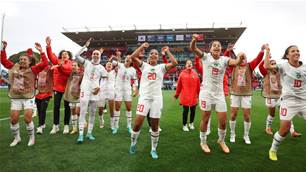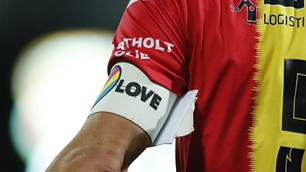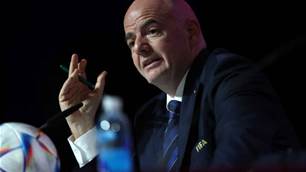UPDATED: Sepp Blatter has been re-elected FIFA president for a fourth term despite a growing row over the controversial election and the way the organisation is run.
Blatter won the election with no other candidate eligible after his only rival - AFC chief Mohamed Bin Hammam - was suspended pending a corruption probe.
Despite that though, 17 of the 203 votes cast in the secret ballot were counted as spoiled papers and effectively votes against him.
Abstentions did not count as votes against Blatter - but with only one name on the voting papers, it was almost impossible to register a protest.
Blatter, 75, will serve for another four years until 2015 when he has previously promised he will step down.
England now look isolated in world football after their attempt to stop the election was defeated by 172 votes to 17, with a further 17 abstentions.
Even Wales and Northern Ireland voted against England, while the fall-out saw several powerful figures in football line up to attack the FA.
Blatter, who had earlier announced a new system of choosing World Cup hosts with all 208 FIFA nations voting instead of the 24-man executive committee, told the Congress: "I thank you for your trust and confidence from the bottom of my heart and together we will have four more years - provided the Lord gives me the life, the energy and the strength to continue on our path.
"I'm happy today we were once again able to bring solidarity and unity into FIFA."
In a reference to proposed reforms to clean up world football, he added: "We shall move forward, we will put FIFA's ship back on the right course in clear, transparent waters. We need some time, we cannot do it overnight, but we will do it."
Blatter also announced an extraordinary congress will be held to examine proposals for other reforms, and that an independent chairman of the ethics committee - the watchdog group set up in 2006 to deal with claims of malpractice in FIFA - will be elected by the Congress.
FA chairman David Bernstein said his organisation's move had been worthwhile and insisted they had not suffered for sticking their head above the parapet.
He said: "After hearing the speech from Sepp Blatter, we believe the calls we have made for greater transparency and better governance have been worthwhile.
"It was positive to be joined by 16 other nations, while a further 17 nations abstaining clearly shows that we are not alone or isolated in our views."
After losing the vote, the FA were the subject of a vitriolic attack by FIFA's senior vice-president Julio Grondona from Argentina.
He told the Congress: "We always have attacks from England which are mostly lies with the support of journalism which is more busy lying than telling the truth. This upsets and disturbs the FIFA family.
"I see it at every Congress. They have specific privileges with four countries having one vice-president.
"It looks like England is always complaining, so please, I say, will you leave the FIFA family alone, and when you speak, speak with truth."
In an interview with a German press agency, Grondona called England "pirates" and added: "With the English [2018 World Cup] bid I said: 'Let us be brief. If you give back the Falkland Islands, which belong to us, you will get my vote'. They then became sad and left."
Bernstein had said the recent scandals, which has seen Trinidad's FIFA vice-president Jack Warner suspended pending a full investigation into bribery charges too, had led to a situation where the election should be re-opened to new candidates.
"We are faced with an unsatisfactory situation. We are subject to universal criticism from governments, sponsors, media and the wider world," he said.
"A coronation without an opponent provides a flawed mandate."
Blatter said he would learn from the "public anger" and would lead FIFA out of their current predicament.
He said: "We have been hit and I personally have been slapped. We have made mistakes and we will learn from this. I can say to a certain extent that this is a good warning, not just to look into our problems and I am willing to face the public anger in order to serve football."
The leaders of associations from Haiti, DR Congo, Benin, Fiji and Cyprus all spoke to criticise the FA's move.
Selemani Owari, president of DR Congo's football federation, made reference to ex-FA chairman Lord Triesman's claims in Parliament of impropriety by four FIFA members during England's failed 2018 World Cup bid.
Owari said: "We are ill at ease with people who wield unfounded accusations - he who accuses must provide evidence.
"FIFA belongs to 208 national associations and not to one association, we must not seek solutions through the media or a Parliament in any third country."
Jim Boyce, from Northern Ireland, was formally appointed as Britain's FIFA vice-president replacing England's Geoff Thompson.
Algerian federation president Mohamed Raouraoua was appointed to take over from Nigeria'sAmos Adamu who was banned by FIFA last year after a Sunday Times investigation.
There have been claims that vote in the Confederation of African Football was not carried out properly but Raouraoua told the Congress: "I have been properly elected even if some people don't like this."
Blatter also suggested in his closing remarks that FIFA would consider co-opting a woman onto the executive committee.
Related Articles

Morocco blazing a trail for Arab women's football participation

FIFA blasted for OneLove armband threat













